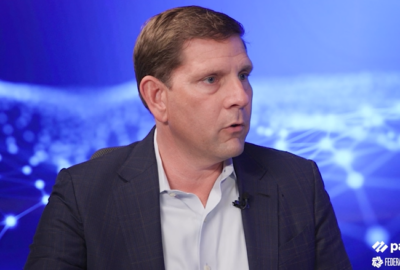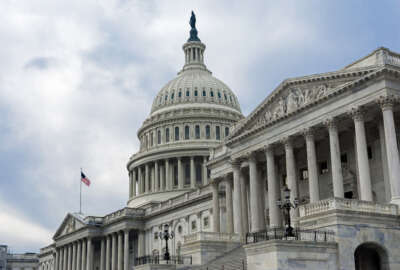The leaders of some of the biggest artificial intelligence companies are joining the new Department of Homeland Security board tasked with examining the use of AI in critical infrastructure.
DHS named 22 individuals to the Artificial Intelligence Safety and Security Board today. They include leaders of top AI firms, including Sam Altman, the CEO of OpenAI, and Dario Adomei, the CEO and co-founder of Anthropic.
DHS says the new advisory committee will provide recommendations “on the safe and secure development and deployment of AI technology in our nation’s critical infrastructure.” President Joe Biden directed DHS to establish the safety and security board as part of his AI executive order.
“Artificial Intelligence is a transformative technology that can advance our national interests in unprecedented ways. At the same time, it presents real risks— risks that we can mitigate by adopting best practices and taking other studied, concrete actions,” Homeland Security Secretary Alejandro Mayorkas said in a statement. “I am grateful that such accomplished leaders are dedicating their time and expertise to the Board to help ensure our nation’s critical infrastructure—the vital services upon which Americans rely every day—effectively guards against the risks and realizes the enormous potential of this transformative technology.”
The new panel also includes Satya Nadella, the chairman and CEO of Microsoft, and Sundar Pichai, the CEO of Google-parent company Alphabet.
Their inclusion, along with Altman’s and Adomei’s, means the heads of the four major US-based AI companies will be directly involved in advising on DHS policies for using AI across the 16 designated critical infrastructure sectors. Those sectors represent vast swaths of the U.S. economy, ranging from telecommunications companies and energy grid operators to food corporations and the healthcare sector.
The four firms last summer established their own “Frontier Model Forum” to develop standards and practices around AI models.
The DHS board also includes the heads of computer chip companies that are essential to AI and machine learning, including Jensen Huang, the CEO of NVIDIA, and Arvind Krishna, the CEO of IBM.
The White House will also have a representative in Arati Prabhakar, assistant to the president for science and technology, and director of the White House Office of Science and Technology Policy.
A full list of the DHS board is at the bottom of this story.
The board’s recommendations are likely to build upon ongoing work across DHS. In a department-wide AI roadmap released in March, DHS laid out some of its plans for advancing safety and security.
The Cybersecurity and Infrastructure Security Agency is leading much of DHS’s work in that arena.
The roadmap shows CISA will work with other agencies to publish AI security guidance at some point this year.
The roadmap also details how CISA, the Transportation Security Administration and the Coast Guard are assessing the “potential risks related to the use of AI in critical infrastructure sectors, including ways in which deploying AI may result in failures, physical attacks, and cyberattacks.”
DHS names director of AI Corps
Meanwhile, DHS this week named Michael Boyce to serve as director of the department’s new “AI Corps.”
Boyce previously was a senior policy analyst focused on the Federal Risk and Authorization Management Program and AI policy at the White House Office of Management and Budget. He also served as a digital services expert at the U.S. Digital Service and worked at U.S. Citizenship and Immigration Services to modernize case management and data solutions for refugee and asylum operations.
As director of DHS’s AI Corps, Boyce will oversee efforts to recruit 50 AI experts to DHS by the end of this year. Those experts will be assigned to various DHS components and offices to work on high-priority AI projects, in a model similar to USDS.
Since announcing the corps in early February, DHS has received more than 3,000 applications for the AI positions.
DHS Chief Information Officer and Chief AI Officer Eric Hysen has said the department is taking an “aggressive” recruiting strategy to fill those AI positions. The department is using direct-hire authority and offering GS-15 level salaries to AI Corps recruits.
The department has already named several areas where officials think AI technologies could be applied, including in identifying fentanyl shipments at U.S. ports of entry, combating child exploitation and abuse, and delivering immigration services.
DHS AI Safety and Security Board members
The full list of the AI Safety and Security Board announced by DHS today is as follows:
- Sam Altman, CEO, OpenAI
- Dario Amodei, CEO and co-founder, Anthropic
- Ed Bastian, Delta Air Lines
- Rumman Chowdhury, CEO, Humane Intelligence
- Alexandra Reeve Givens, president and CEO, Center for Democracy and Technology
- Bruce Harrell, Mayor of Seattle, Wash., and chairman of the Technology and Innovation Committee at the United States Conference of Mayors
- Damon Hewitt, president and executive director, Lawyers’ Committee for Civil Rights Under Law
- Vicki Hollub, president and CEO, Occidental Petroleum
- Jensen Huang, president and CEO, NVIDIA
- Arvind Krishna, chairman and CEO, IBM
- Fei-Fei Li, co-director, Stanford Human-centered Artificial Intelligence Institute
- Wes Moore, governor of Maryland
- Satya Nadella, chairman and CEO, Microsoft
- Shantanu Narayen, chairman and CEO, Adobe
- Sundar Pichai, CEO, Alphabet
- Arati Prabhakar, assistant to the president for science and technology, and director of the White House Office of Science and Technology Policy
- Chuck Robbins, chairman and CEO, Cisco
- Adam Selipsky, CEO, Amazon Web Services
- Lisa Su, chairman and CEO, Advanced Micro Devices (AMD)
- Nicol Turner Lee, senior fellow and director of the Center for Technology Innovation, Brookings Institution
- Kathy Warden, chairwoman, CEO and president, Northrop Grumman
- Maya Wiley, president and CEO, The Leadership Conference on Civil and Human Rights
Copyright
© 2024 Federal News Network. All rights reserved. This website is not intended for users located within the European Economic Area.





